Wednesday, June 27, 2007
Dear Diary
FUN FACT/QUOTE OF THE DAY: The plaza was tear-gassed last week while students were protesting for university autonomy. Oski would be proud!
Friday, May 25, 2007
Haikus for Bolivia
Saturday, March 31, 2007
From Santa Cruz


This is from my friend Jenny, another volunteer. Note that 1) snacks come before medical attention, and 2) no one is surprised.
Ahh, Bolivia:
..I got on my normal train at 2am from San Jose to Santa Cruz. I fell somewhat asleep until I was woken up by the intense bumping and terrible train sounds. Then I woke up to see all my stuff from the right side of the train fall and smash into all the people sitting on the left side of the train. Then we were stopped. No one seemed to be getting upset or freaked out at all which I was more in shock about than this train problem. Well the people in charge started yelling not to move or we would tip the train over. This is when I started to wake up enough to notice that out car was almost completely sideways. People slowly starting getting out of the train one by one with the help of the guys who were pulling us out of the train. Of course my pants got stuck and I was sort of hanging from the train there for a second but the some nice guy caught me. The car behind mine was even worse and was completely sideways and the people were climbing out the windows. Somehow during all of this no one was hurt, no one seemed to express anger or fright, or even annoyance. The Bolivians just seemed to take it as oh damn our train crashed time to hang out and wait. I was thinking holy shit I was just in a train wreck this is so cool and crazy.
When the sun came up after an hour of our crash at 5 it started getting hot. So the Bolivians started making fires which I thought was weird since it was so hot already and who packed for food for the BBQ but then I noticed we didn't have any food for that and someone informed me it was to keep away the killer mosquitoes who were eating us alive. Then the Bolivians started picking these huge leaves from the brush and wearing them on their heads like hats to keep cool. After about 6 or 7 hours I was getting annoyed and the novelty of the crash had worn off but I still didn't seem to see any Bolivians complaining. We finally were given some water and a piece of bread about 7 hours in and finally after 9 and a half hours of waiting a train from the other direction came and picked us up. They handed out fried chicken and rice to us and now after 9 and a half hours sent around doctors to check and see if we were all right. We endured the next 5 and a half hours on the train to the bridge near Santa Cruz where they then transferred us to buses to take us the rest of the way. Meanwhile feeling pretty nasty and tried a camera crew and news woman ran up to me and started interviewing me about the crash. I felt so gross and tired I pretended not to speak Spanish and they went away eventually. So at 7 p.m. we finally arrived in Santa Cruz only 11 hours later than expected.
FUN FACT/QUOTE OF THE DAY: "My host mom gave me a gun to shoot the donkey that keeps coming into my courtyard."
Saturday, January 27, 2007
Campo Envy


The meeting is underway. Having stuttered out my part, I am examining the mud and straw-thatched roof of the room we are in thinking, this is where Chagas disease comes from. The socias are signing their guarantee of the women in their solidarity group, surrounded by children who shuffle restlessly and drift in and out of the room with the dust particles. One child stays the whole time. He constantly has a smile on his face but amuses himself by covering his ears and screaming every ten minutes. It’s unnerving. “Smiles” steals a 1 Bs. coin during the loan disbursement, which no one notices until he swallows it and promptly vomits. I start to panic because I don’t know if you can perform the Heimlich on a two-year old, but just then he swallows the pesito completely and starts bawling. I go home and Google
M: I am from the U.S., but my parents were born in China. How far do you have to travel to sell your vegetables?
S: Depends, sometimes far. Japan is pretty far, isn´t it?
Sometimes the women even give us fruit, pastries of fried goodness, or refrescos (warmish corn porridge drink with little black specks of suspiciousness, or a neon soda that tastes like carbonated liquid jello). I miss these long days of travel to and from the communities, getting stuck in storms, daydreaming in each town about where I would live if it were my site. The last month I’ve been office-bound, turning my surveys into something measurable. Outside my non-ergonomic holding cell, December passed with another B43 volunteer resignation and a temporary evacuation of our
Not to be outdone by the cambas, last week
FUN FACT/QUOTE OF THE DAY: Bringing large amounts of toilet paper on the bus can be considered cocaine paraphernalia during drug check stops.
Friday, December 15, 2006
White Christmas
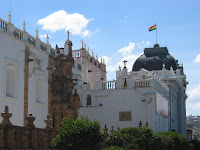
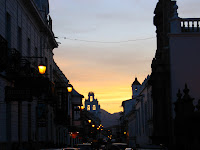
For the next two years I will be living in Sucre developing the rural credit program of Pro Mujer, a NGO that micro-finances women´s enterprises. It is a great organization and I didn´t think I would get the opportunity to do something like this. But while I´ll be travelling out to our rural communities for work almost everyday, it will be a much more structured, fast-paced, and professional city environment than my campo expectations.
We took our tests and swore our service oaths the first week of November, a month after site announcements. I thought it would be hard to leave B43 but the first month has passed at warp speed. Travel to Sucre from Cochabamba is a 10-hour night bus via a sometimes paved road with less than pleasing accident statistics. It isn´t that bad besides the inconvenient angle of the seats that is constantly sifting its occupants down into the footwell, and the ridiculous heat blasting along the walls. As many Bolivians believe all sickness comes from cold air, opening windows have been known to start flota brawls.
Sucre is a beautiful city. Tiny, at 250,000, and clean by Bolivian standards. Some volunteers find Sucre too small and tranquil but I love the colonial architecture, which gives it its name of “The White City”, and the fact that unlike Cochabamba I have been able to break bills larger than 10 Bs without playing the change game. The pristine white buildings and internationals thronging the town center cover up a city that´s said to rest more on past reputation than present. Established by the old money of Potosí, Sucre is now one of Bolivia´s two official capitals in name only. I´ve also been told the University San Francisco Xavier, famous for its incubation of independence ideas, has been losing its edge to newer private universities. The current debate whether the new constitution should be approved by 2/3 vote or simple majority of the Constituent Assembly has brought in some activity, but aside from the older families and students Sucre has seen a lot of migration to more progressive departments like La Paz and Santa Cruz.
I love my project, as painful as it was to reacquaint myself with an office setting. Imagine deleting documents several times while relearning every keyboard shortcut in Spanish. But since that first week I´ve spent some happy, spine-wrecking (more on this later) weeks with our rural groups for my project diagnostics. To get along in the campo I am also learning Quechua, an aggregating language of the Andes that was never meant to be a written language. That means different regions of Bolivia have differing ways of writing Quechua, and by aggregating I mean you tack an increasing number of suffixes onto a base word to indicate adjectives, verbs, adverbs, etc. So killa, the word for month, becomes qhepankillakama for “until next month”.
There are Christmas lights up in the main plaza now, and I am homesick.
Sunday, October 15, 2006
Falta


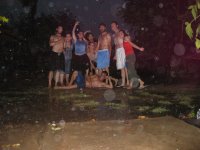
Me: “Why is there a blockade today/do you serve rice and two types of potatoes in one meal/is that child pooping on the sidewalk?”
Bolivian: “Por falta de plata/educación/[insert any other element of infrastructure here], you jerk.*”
(* Bolivian does not actually say “you jerk”, but that is the feeling I get)
I use it more to tell how adjusted I’m feeling, since at any given moment I might be feeling falta my family or friends at home, pad kee mao (with tofu, spiciness level 7 on a scale of 1-10), water pressure, privacy, red velvet cake, etc. But it’s more a factual lacking than a terrible missing, so as B43 hits month 2 I think I’m settled in. I have stopped feeling a little sick after every meal and can brush my teeth without filtered water. Trips to the hospital are no longer a shock now that more than half the group has had amoebas or bacteria or giardia. We’ve also passed the milestones of getting out of robbery set-ups and the first resignation from our group last month.
Training winds down with a technical week running a business simulation, this year in the department of Santa Cruz. It was the first of the media luna, the half moon of departments that passed referendum on the Autonomia movement for political decentralization last summer. To get to Santa Cruz we drive through the Chapare, the dominating province of the department of Cochabamba. It is lush mountain valleys of green, wrapped in cloud and that great simultaneous smell/feel/sound of damp, breathing jungle. In the 80s cholitas would sell cocaine in piles by the roadside. Today, anti-U.S. hostility over coca eradication and DEA activity mean Peace Corps volunteers aren’t even allowed to travel here.
Santa Cruz city feels like another country. It is tropical, modern, sprawling. We arrive at 1 a.m. and I am hotter than I have been my entire time in Bolivia. The hostel shower shoots one stream of water at the ceiling, the other at the towel rack, and delivers a mild electric shock if you try to adjust the showerhead. Luckily, we leave the next morning for San Jose de Chiquitos, a small town on the Jesuit Mission circuit, via a hellish 10-hour rocky dirt road. It is so hot in Santa Cruz I take cold showers for sanity. On the bright side, cold showers give me the best water pressure I’ve had in Bolivia, since in our host community every shower in town (all three of them) gets hotter the lower you turn the water on.
Within Bolivia there is regional rivalry between the Cambas of the tropics and the Collas of the highlands. I’ve decided the Collas have got it on climate and this heat-humidity just destroyed my life goal of living in a rainforest. We ooze through the week teaching classes and understanding why nothing moves between the hours of noon and 4 except the hammocks strung up in every open shaded space.
If I had a project that could afford me lying in a tub of ice for 6 hours during the middle of the day, I would love to live in Santa Cruz. The humidity (or heat delirium) intensifies every color, there is constantly the sound of living things, and the weather is wild. Heat gives way to freezing surazo winds that roll in unchecked by the flatness of the Chaco to the south, or the humidity topples over into explosive tropical storms. It’s almost neat enough to make you overlook being hit in the head by careening, giant horned beetles every night.
FUN FACT/QUOTE OF THE DAY: In Bolivia, it’s good luck to pinch black people.
Thursday, September 14, 2006
It´s Not Okay
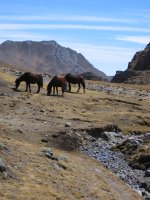
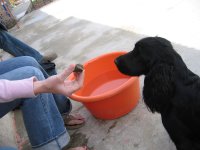
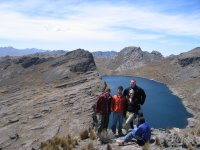
Someone wrote an article in the Peace Corps Bolivia newsletter about keeping perspective. As in, even though we are in Bolivia and getting sick happens, it is not okay to shit in your pants. Don’t judge us, this is easy to forget when you have amoebas, giardia, or salmonella. And honestly, there’s a lot that’s not okay here. No one uses trashcans. Ever. Some Bolivians’ besito greetings are really besito-not-so-ito. My host family’s dog plays fetch with rocks. There is a lynched dummy hanging in town to show what happens to thieves. It. Is. Not. O. K.
But it becomes ok pretty quickly. For example, transportation. At the local level it’s by taxi-trufi, trufi, or micro. These are cars, mini-vans, or small buses, respectively, that drive a set route and stop whenever someone yells “Pare/parada/la esquina por favor!”. All involve cramming three more people than is humanly possible into a torn up vehicle. But it’s easy to learn and cheap, < $0.25 a pop. Pretty soon you don’t even think about curling up on a spare tire in a taxi-trufi with 10 other people. When the micro is so full that the door doesn’t close, just make sure you have a good handhold. The two inches between your leg and the wall is DEFINITELY enough room to squeeze in someone’s cho bag, cake box, or child.
Trufis are a lot sturdier than they look. Dan’s host dad drives one and took us to Tunari National Park last weekend and that thing takes switchbacks and dirt/rock roads like a pro. Tunari is stark-beautiful. We’re at the end of the dry/winter season, so nothing is green. At 14,000 feet it’s steep faces of shale and scree, patches of dry yellow grass or lichen and no trails. You just climb as much as the falling rocks and your weak gringo lungs let you in whatever direction looks least sketchy. Llama and pony herds are scattered around shallow, minerally, mirrored lakes. Below the peaks are flats of yellow and dark red moss that sink down in patches to show the water below it. Walking over it feels like walking with moon shoes. Next time we go, maybe I won’t be wheezing like I collapsed a lung.
I think I’m slowly settling into a routine again. Training can be wear and tear, especially when we’re running over schedule and the word “Peet´s” makes me cry a little. What is the obsession with Nescafe on this continent?? Jenny and I found some good paths so I’ve started running again. The roads here are loose dust and rocks, not really zone-out material. After a few face plants I think my balance is getting better, and I’m working on the dog issue. I learned quickly dogs aren’t pets; they have a purpose like all the other animals. Apparently, the job of a dog is to guard the house, bark for ten minutes before/after anyone passes by, and chase Asian people. Ok, they chase Bolivians too because every dog knows to stop immediately when you bend down for a rock or pitch your arm back in a mime throw. I know you’re not supposed to let dogs sense your fear, but every time I get charged I think about how Bolivia has like 500 cases a year of rabies. We’re still not sure if the poor little puppy in the picture on my last post died of rabies or rotten eggs, but since he was chewing on everyone’s hands I hope Purell kills the rabies virus.
FUN FACT/QUOTE OF THE DAY: “That chick was mad indigenous.”





